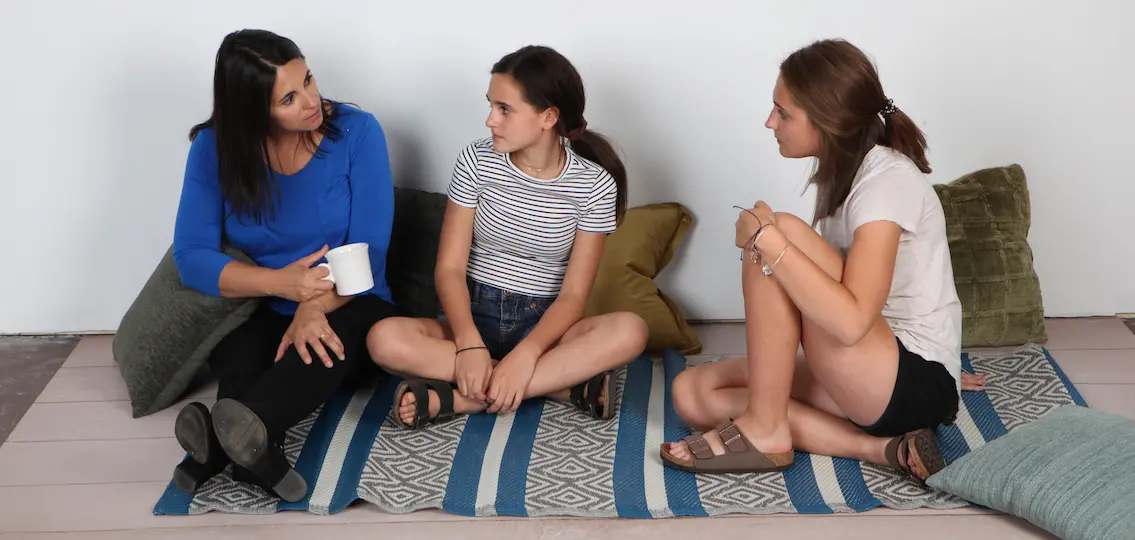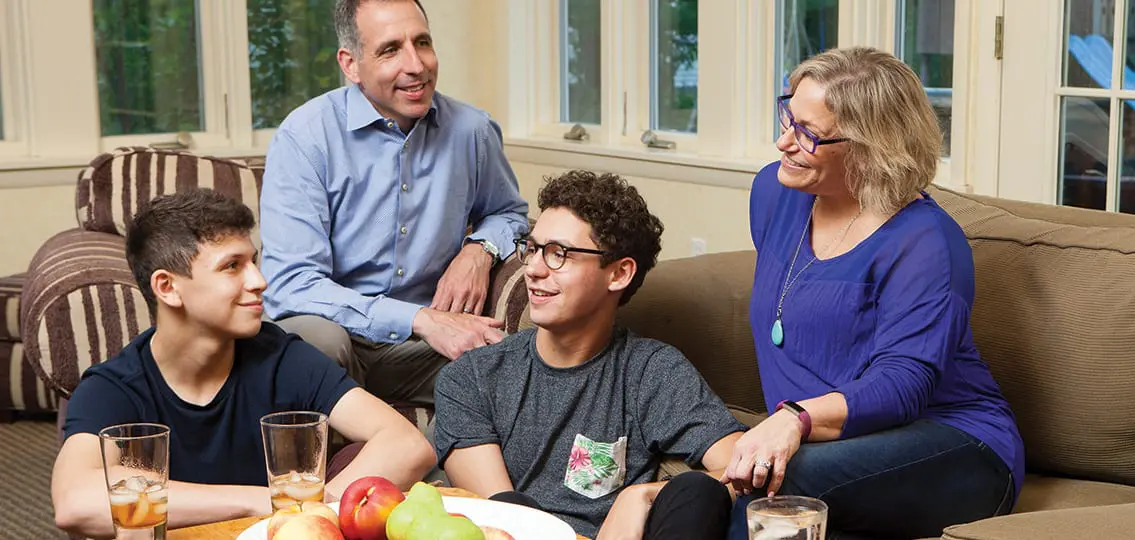It can be hard enough to have a conversation with your teenager about cleaning their room or remembering to call you when they’re out. When it comes to talking about the big stuff, like race, many parents get tongue-tied. They are not sure how to discuss race with their teenagers.

I’m the author of Bringing Up Race: How to Raise a Kind Child in a Prejudiced World, a book I wrote to help parents engage openly and honestly with kids of all ages. As a Black mother raising two boys, I’ve been having these talks since they were small. Now that my sons are 15 and 12, our conversations have evolved organically. Here are some of my tips for talking to your teen about race and racism.
How to Discuss Race with Teens
1. Talk about what they’re hearing on the news.
No matter their age, do your best to shield your child from graphic or violent imagery. The viral sharing of Black bodies being brutalized is both dehumanizing and desensitizing. However, most teens will pick up on major news stories through mainstream channels and social media. So don’t switch off and pretend it’s not happening.
Talk to your teen about what they might have seen or heard and how it makes them feel. It’s okay to share some of your own difficult and painful feelings around events too. You don’t have to act like you have all the answers, but it helps to show empathy. It also builds trust with your teen so you can have more open conversations going forwards.
Try to connect the dots between where we are and how we got here: For instance, violence against Black people has a long history in the U.S. going back to slavery. But there’s also a long tradition of people resisting injustice. Discuss what actions you can take to promote racial justice in your community such as joining a protest march, starting a petition at school, or writing a letter to your representative.
2. Expand on what they’re learning at school.
Whatever your teen is learning about race at school, you can almost guarantee that it’s not enough. The mainstream education system does not depict a true and inclusive picture of American history. Some U.S. states are going as far as banning the teaching of critical race theory in schools.
Ask your child what lessons they’re being taught about race at school. Find out what books they’re reading as classroom texts or how their teacher approaches conversations around race, diversity, and social justice. Challenge your teen to go beyond the classroom and explore other educational resources such as these by the Smithsonian, The 1619 Project, or the National Museum of African American History & Culture. In fact, why not make this a family project? It’s an opportunity to discuss race with your teens and boost your own learning on this important topic too.
3. Discuss the way they talk about race with their peers.
If you eavesdrop on your teen when they’re talking to their friends, you might get a rude awakening. Teenagers can sometimes sound quite crass and even bigoted. If your child says something offensive, try not to fly off the handle about it. Kids say a lot of stuff they don’t mean. However, do disrupt it with a simple “Hey, that’s not cool” or “Have you thought about what you’re saying?” Steer them towards kinder, more inclusive language. Remind them frequently to check their privilege or biases.
Be sure to remark on what they’re doing right too. Using phrases like “I’m so proud that you’re the kind of person who speaks out against discrimination” will reinforce and remind them of the kind of person they want to be. Above all, focus on listening and asking questions, rather than lecturing them. You will learn a lot about your teen and how they engage with the world outside your front door.
4. Watch out for the type of media they consume.
Teens need their privacy, but it’s essential for parents to be aware of what media they’re consuming. You should have discussions about how to use technology safely, and also how to look for multiple, trusted sources so they don’t get stuck on a singular perspective.
Like most teenagers, my boys are glued to their phones 24/7. Every now and then, I’ll prod them about what they’re watching and ask them to tell me about it in their own words. I’ve done this ever since my eldest became obsessed by WWE wrestling at age 6. One day, I asked him to tell me about it. After he spoke for over an hour, I realized there was more to it than guys beating each other up! He was drawn in by the storytelling, mythmaking, and displays of strength, camaraderie, and resilience.
One thing I recommend is watching shows with your teen. As a family, we watch a wide range of TV including older shows that might be lacking in racial sensitivity. You might avoid these, but I see it as an opportunity to have nuanced discussions with kids around narratives and how they evolve. You can talk about why so much media centers a white (often male) perspective and why it’s important to seek out more diverse stories. Here’s a list of shows and films to spark conversations around race.
5. Talk about how to respond to a racist comment or incident.
Most children will encounter some form of racism or bigotry by the time they reach high school. Whatever your child’s race or ethnicity, it’s crucial they learn how to respond. Should they challenge the offender, or is it safer to walk away? Can they turn to a trusted adult? What kinds of things should they say?
Role play at home can be helpful. It’s also useful to arm your teen with simple, set phrases like, “Don’t say that. It’s racist” or “Just stop. I don’t find racism funny.” The key lesson is to disrupt racism as it happens and not to be a passive (and complicit) bystander. However, teach them to avoid confrontation if they can and to ask a grownup for help if a situation escalates.

Encourage your child to come to you if they experience racism. Explain what steps you will take to address it with their teacher, school principal, or other authority if it needs further action. It’s important that your teenager understands racism is not a thing to brush off lightly—and, also, that they will always have your full support.




